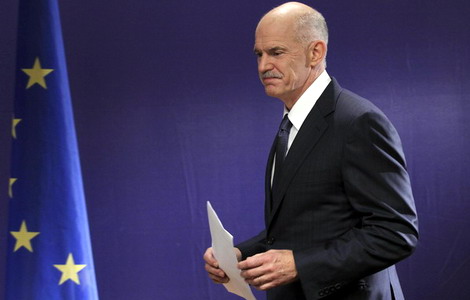Sound bite: Experts' view on the G20 Summit in France
Updated: 2011-11-02 19:18
By Ariel Tung, Eveline Filon, and Cecily Liu (chinadaily.com.cn)
|
|||||||||||
Analysts from across the globe share their views with China Daily on the prospects of the upcoming G20 Summit in Cannes, France, world economic governance, and the risk of a double dip recession.
|
 |
Lans Bovenberg |
We need better economic governance, especially with regards to the IMF. BRIC countries need more influence in the IMF, it is important that their needs are also taken care of.
Need more control of the banks; Need more risk carrying capital; there are harmonization problems as there is not always enough capital available. We also need agreement on the amount of risk carrying capital the EU has now reached a deal, but now other countries need to agree with this as well.
Banks need to have less risk. High risk issues such as mortgages and pension funds should be dealt with by specialised institutions.
The above points need to be harmonised across the world in order for them to have a real effect. About Cannes Summit, hopefully there will be progress with regards to both the issue of risk capital and risks for banks.
Creditor countries such as China, but also the Netherlands, Germany, Switzerland and Norway, have two responsibilities: They need to stimulate domestic demand. This is especially true in the case of China.
They also need to make sure enough money is available for southern European states, especially when their demand will also go up and thus the demand for export (of creditor nation goods) and import (towards debtor nations).
The IMF needs to be strengthened, and be able to lend money to Southern European states, however strong conditions need to be attached to this.
|
 |
Stephen Roach Non-Executive Chairman, Morgan Stanley Asia |
The goal of this summit will be to put European Monetary Union (EMU) fears to rest once and for all. That becomes exceedingly more difficult to do in light of the shocking announcement of a Greek referendum on the plan.
This latest development underscores what has long been the weakest link in the EMU chain -- the lack of a political and fiscal union.
Last week's summit did little - if nothing - to address that critical issue. Nevertheless, I look for Sarkozy to still try and put a positive spin on the Summit by taking the lead in revealing greater specificity to last week's deal on EFSF expansion, bank recaps, and the 50 percent haircut on Greek debt.
There is an outside chance of a joint announcement about Chinese participation in funding the EFSF expansion -- although it is unclear if Europe will have had the time to come up with a "quid pro quo" in terms of any assurances it may offer China in response. Barring that reciprocity, any Chinese announcement on its Euro support program may be deferred.
 |
Derek Scissors Research fellow, the Heritage Foundation |
The usual definition of recession is two negative quarters of GDP growth. This is not helpful. Examining individual wealth instead of GDP, the recession never ended in many countries, while others saw slower growth but no recession at all. We are still in the same weak economic period as started in 2007.
 |
Stephen Gallo, Head of market analyst, Schneider Foreign Exchang |
We never left a recession. Although we do not have negative growth rates, it does not mean that our economy is healthy. This can be shown through the lack of business confidence, consumer confidence, investment decisions made, and a slowing real rate of growth in relation to nominal rate of growth. When banks are bailed out during the financial crisis, a private sector problem was transferred to the public sector. This transfer of burden did not really generate growth.
Currently the US, the EU and China all have different problems. There may be a lot of bickering at the G20 and it is hard to say if G20 leaders can come up with a cohesive plan at all.
Europe has large debt problems, which restricts its economy from having robust growth. The EU may need to address its debt crisis first.
G20 leaders may put pressure on the US to control the value of the dollar. The cause of the 2008 crisis was the availability of cheap credit, the US needs to restrict the liquidity of the dollar now so to avoid the same problem happening.
China's problem is its asset price bubbles. If the problems of asset price bubbles are not addressed, the bubbles may eventually burst, and the country may have weaker growth for two to three years. Its private sector may require more government support, and China may lose legitimacy and respect as a global economy.
 |
Didier Cossin Professor of Finance and Governance, IMD Business Scholl |
This (double dip recession) is a governance problem, and not an economic problem. Obviously there is risk, but whether a double dip recession happens or not depends on political leaders' ability to make decisions from the top.
The EU has not shown great governance skills. Greece's problem occurred 18 months ago, and its problems could have been solved a long time ago if decisions were made quicker. Europe's economic situation is not very dramatic, good governance can bring about a healthier economy.
The EU's economic problem is not beyond capacity. The European economy needs major restructuring for some of its countries, for example Greece and Portugal. Next, there are countries like Italy, where there may be hidden management and accountancy problems.
Good governance is not a question of trying to avoid a double dip recession; it is a question of restructuring Europe for the next five to ten years, or even 20 years to come. Inevitably European countries will suffer in the shorter term. For example, the GDP of Greece many drop by 10-20 percent and its debtors may have to take a 50 percent haircut. If its government implements sound decisions to live through the recession, its economy may become more healthy and competitive again. But implementing such decisions requires strong political will, but overall it is difficult to ensure compliance from different governments.
Interviews done by Ariel Tung, Eveline Filon, and Cecily Liu
Hot Topics
Libya conflict, Gaddafi, Oil spill, Palace Museum scandal, Inflation, Japan's new PM, Trapped miners, Mooncake tax, Weekly photos, Hurricane Irene
Editor's Picks

|

|

|

|

|

|







